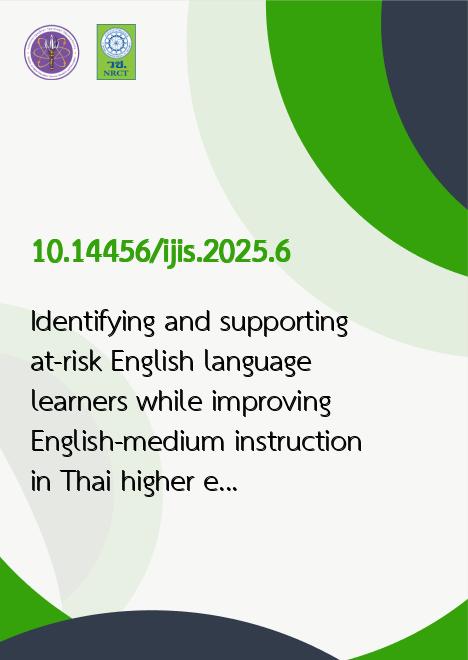
|
Identifying and supporting at-risk English language learners while improving English-medium instruction in Thai higher education |
|---|---|
| รหัสดีโอไอ | |
| Creator | Charlton Bruton |
| Title | Identifying and supporting at-risk English language learners while improving English-medium instruction in Thai higher education |
| Publisher | Burapha University, International College |
| Publication Year | 2568 |
| Journal Title | International Journal of Interdisciplinary and Sustainability (IJIS) |
| Journal Vol. | 1 |
| Journal No. | 2 |
| Page no. | 15-50 |
| Keyword | at-risk learners, English-medium Instruction, Insider Practitioner Research, Intercultural Communication, Self-determination, Teacher Scaffolding |
| URL Website | https://so11.tci-thaijo.org/index.php/IJIS |
| Website title | https://so11.tci-thaijo.org/index.php/IJIS/article/view/1794 |
| ISSN | 3088-2039 |
| Abstract | This study explores the identification and support of at-risk English Language Learners (ELLs) at a Thai International College, who were new to English-medium instruction (EMI). Navigating the complexities of Second Language Education (SLE) within non-English speaking environments remains a significant challenge, particularly for students who have limited intercultural experiences. However, by utilizing an applied interdisciplinary approach, insider practitioner research (IPR) was combined with targeted teacher scaffolding to identify and support at-risk English Language Learners (ELLs) at a Thai international college. Through a contextualized observation protocol and survey validation, twelve at-risk ELLs, marked by limited participation, intercultural communication difficulties, and emotional discomfort, were identified for interviews and scaffolding interventions. The findings revealed substantial language barriers, intercultural miscommunication, and academic stress, leading to self-isolation, concerning behavior, and hindered progress. The scaffolding intervention, grounded in inner development and self-determination, proved instrumental in fostering confidence and cultivating self-determined learning. This research underscores the necessity for international institutions to provide targeted language support, English integration, curriculum adaptations, and intercultural orientation programs to enhance ELLs academic self-efficacy and overall well-being. By illuminating the interplay between inner development and self-determination, this study demonstrates the potential for at-risk ELLs to thrive in international higher education. |